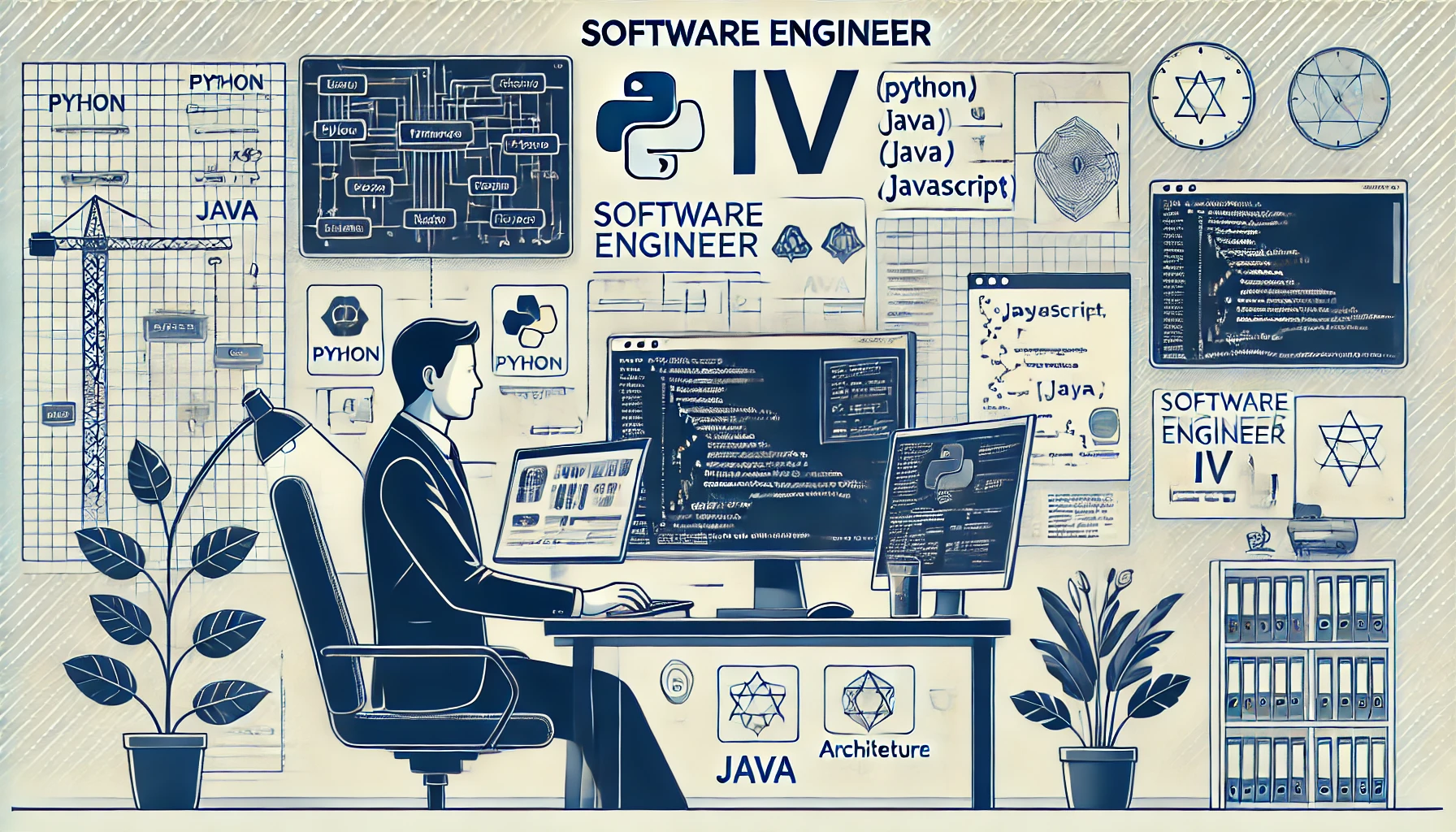Table of Contents
- Introduction
- Key Responsibilities
- Skills and Qualifications
- Educational Background
- Experience Requirements
- Career Path and Growth Opportunities
- Challenges Faced by Software Engineer IV
- Best Practices for Success
- Work Environment
- Tools and Technologies
- Salary Expectations
- FAQs
- Conclusion
Introduction
A Software Engineer IV Job Description details a role that is pivotal in the engineering hierarchy, typically designated to seasoned professionals with extensive experience in software development. These engineers are expected to lead complex projects, mentor junior engineers, and contribute to the overall architecture and strategy of the software development process. This blog post will provide a comprehensive overview of the responsibilities, skills, qualifications, and opportunities associated with the role of a Software Engineer IV.
Key Responsibilities
The responsibilities of a Software Engineer IV are both broad and deep, reflecting their seniority and expertise. Here are some of the key responsibilities:
1. Project Leadership
A Software Engineer IV often leads multiple projects, ensuring that they are delivered on time, within scope, and of high quality. This involves coordinating with cross-functional teams, managing resources, and mitigating risks.
2. System Architecture
They are responsible for designing and overseeing the implementation of complex systems. This includes making high-level decisions about architecture and design patterns that will be used across the organization.
3. Code Review and Quality Assurance
Maintaining code quality is crucial. A Software Engineer IV conducts rigorous code reviews and implements best practices in testing and quality assurance to ensure the reliability and maintainability of the software.
4. Mentorship and Training
An essential part of the role is to mentor junior engineers. This includes providing guidance, conducting training sessions, and fostering a culture of continuous learning and improvement.
5. Innovation and Improvement
They are expected to stay abreast of new technologies and methodologies, proposing and implementing improvements to existing systems and processes to enhance efficiency and performance.
6. Stakeholder Communication
Effective communication with stakeholders, including product managers, business leaders, and clients, is vital. They must be able to translate technical details into business value and vice versa.
Skills and Qualifications
To excel in a Software Engineer IV Job Description, a combination of technical and soft skills is required. Here are some of the essential skills and qualifications:
Technical Skills
- Programming Languages: Proficiency in multiple programming languages such as Java, Python, C++, and JavaScript.
- Frameworks and Libraries: Deep understanding of frameworks and libraries relevant to their domain, such as React, Angular, Spring, Django, etc.
- Database Management: Expertise in both SQL and NoSQL databases like MySQL, PostgreSQL, MongoDB, and Cassandra.
- DevOps Practices: Knowledge of CI/CD pipelines, containerization tools like Docker, and orchestration platforms like Kubernetes.
- Cloud Computing: Experience with cloud platforms such as AWS, Azure, or Google Cloud.
- Security: Strong understanding of cybersecurity principles and practices.
Soft Skills
- Leadership: Proven leadership skills to manage teams and projects effectively.
- Communication: Excellent verbal and written communication skills.
- Problem-Solving: Strong analytical and problem-solving abilities.
- Collaboration: Ability to work effectively in a team environment.
- Adaptability: Flexibility to adapt to changing technologies and project requirements.
Educational Background
While specific educational requirements can vary, most Software Engineer IV Job Descriptions will specify the need for a strong educational background in a relevant field. Typically, this includes:
1. Bachelor’s Degree
A bachelor’s degree in computer science, software engineering, or a related field is usually required.
2. Master’s Degree
Many positions prefer or require a master’s degree, especially for roles that involve complex project management or advanced technical responsibilities.
3. Certifications
Certifications in specific technologies or methodologies (e.g., AWS Certified Solutions Architect, PMP, Scrum Master) can be advantageous.
Experience Requirements
The role of a Software Engineer IV generally requires significant professional experience. This includes:
1. Years of Experience
Typically, a minimum of 8-10 years of experience in software development is expected.
2. Project Portfolio
A robust portfolio of successful projects, demonstrating the ability to manage complex systems and deliver high-quality software.
3. Leadership Experience
Experience in a leadership role, such as leading a development team or managing large-scale projects.
Career Path and Growth Opportunities
The role of a Software Engineer IV is a senior position that offers numerous opportunities for career growth. Here are some potential career paths:
1. Principal Engineer
A step above the Software Engineer IV, focusing more on strategic technical decisions and less on day-to-day coding.
2. Engineering Manager
Transitioning into a management role, overseeing multiple teams and projects, and focusing on people management.
3. Architect
Specializing in system architecture, designing large-scale systems, and setting technical direction for the organization.
4. CTO or VP of Engineering
For those with a strong business acumen, moving into executive leadership positions within the technology domain.
Challenges Faced by Software Engineer IV
Despite the rewards, the role comes with its own set of challenges:
1. Keeping Up with Technology
The fast-paced nature of technology requires constant learning and adaptation.
2. Balancing Leadership and Technical Duties
Finding the right balance between hands-on coding and leadership responsibilities can be difficult.
3. Managing Stakeholder Expectations
Ensuring that all stakeholders are satisfied with the project outcomes can be challenging, especially when dealing with competing priorities.
4. Mentoring Junior Engineers
Providing effective mentorship while also focusing on one’s own tasks requires excellent time management skills.
Best Practices for Success
To thrive in a Software Engineer IV Job Description, adopting certain best practices is beneficial:
1. Continuous Learning
Stay updated with the latest technologies, trends, and best practices in software development.
2. Effective Communication
Develop strong communication skills to effectively convey technical concepts to non-technical stakeholders.
3. Collaboration
Foster a collaborative environment where team members feel valued and motivated.
4. Quality Focus
Prioritize code quality, testing, and documentation to ensure the long-term maintainability of the software.
5. Time Management
Efficiently manage time to balance coding, mentoring, and project management duties.
Work Environment
A Software Engineer IV typically works in a dynamic environment that fosters innovation and teamwork. Here’s what you can expect:
1. Office Setting
Many work in corporate office settings, often in tech companies or IT departments of large organizations.
2. Remote Work
With the rise of remote work, many companies offer flexible work arrangements, allowing engineers to work from home.
3. Collaborative Spaces
Work environments often include collaborative spaces to facilitate teamwork and innovation.
4. Tools and Resources
Access to the latest tools, technologies, and resources needed to perform their job effectively.
Tools and Technologies
A Software Engineer IV utilizes a variety of tools and technologies to accomplish their tasks:
1. Development Tools
IDEs like IntelliJ IDEA, Visual Studio Code, and Eclipse.
2. Version Control
Tools like Git and platforms such as GitHub or GitLab.
3. Continuous Integration/Continuous Deployment (CI/CD)
Tools like Jenkins, Travis CI, and CircleCI.
4. Containerization and Orchestration
Docker and Kubernetes.
5. Monitoring and Logging
Tools like Prometheus, Grafana, and ELK Stack.
6. Cloud Platforms
AWS, Google Cloud, Azure.
Salary Expectations
The compensation for a Software Engineer IV reflects their experience and the complexity of their role:
1. Base Salary
The base salary typically ranges from $120,000 to $180,000 annually, depending on location and company.
2. Bonuses and Incentives
Performance bonuses and stock options are common additional compensations.
3. Benefits
Comprehensive benefits packages, including health insurance, retirement plans, and professional development opportunities.
FAQs
Q1: What is the primary role of a Software Engineer IV?
A Software Engineer IV leads complex projects, designs system architectures, ensures code quality, mentors junior engineers, and communicates with stakeholders.
Q2: What skills are essential for a Software Engineer IV?
Essential skills include proficiency in multiple programming languages, strong leadership and communication skills, and expertise in system architecture and cloud platforms.
Q3: How much experience is required for a Software Engineer IV position?
Typically, 8-10 years of professional experience in software development, along with leadership experience, is required.
Q4: What are the career advancement opportunities for a Software Engineer IV?
Career paths include roles such as Principal Engineer, Engineering Manager, Architect, or executive positions like CTO.
Q5: What challenges do Software Engineer IVs face?
Challenges include keeping up with technological advancements, balancing leadership and technical duties, managing stakeholder expectations, and mentoring junior engineers.
Conclusion
A Software Engineer IV Job Description encapsulates a role that is integral




Leave a Comment